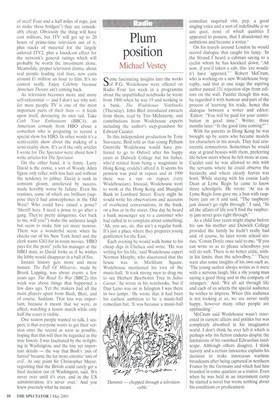Menace in the rain forest
Simon Hoggart
IThad the chance to catch only the first of the new I'm A Celebrity — Get Me Out Of Here! (ITV) before press day, but naturally the moment I saw John Fashanu have thousands of biting insects poured into a sort of plastic pants round his midriff, and learned that a model of whom I had never heard was to be thrown into a pond with at least one (count it!) crocodile, I was hooked. Late last summer, when the first series was shown, we'd have people round for dinner, and around 8.55 you'd notice they had almost as many ants in their pants as Fashanu did this week, When we explained that of course we were taping Celebrity and we could watch it later, they became very calm and stopped hyperventilating.
All of which is strange, since programmes like this are a real menace. In the States they are spreading like some awful infectious rash. They are called 'reality' shows. though there is more about the true state of the human condition in a single episode of Poirot than in all of Big Brother and Fame Academy. These unreality shows impose bizarre fictional constructs onto normal people (the genius of Celebrity is that it uses D-list celebs — plus Wayne Sleep, a man with a genuine talent — who exist on the margins of our consciousness. It wouldn't work with unknown members of the public, and it wouldn't work with real stars, such as David Beckham, Madonna or Michael Caine. These are twilight folk, the people-who-are-sometimeson-television-but-arehardly -differentfrom-us, people who are hardly better than us, but just famous enough to need taking down a peg).
Presiding over it all are Ant and Dec, the two cheeky lads who live down your street. One day I'll find somebody, perhaps their agent, who knows which of them is which, Their job, apart from gurning at the camera to indicate how lucky we all are not to have to eat mealworms, stink beetles and night crawlers like the celebs, is to write down the result of the listeners' votes (25p a call, of which 15p goes to charridee) as they arrive from the UK. So, you want to see a blonde model wrestle with a crocodile? Within micro-seconds your desire is transmitted to the Australian rain forest. And Captain Cook died for this?
The dirty little secret of shows like this is that in spite of the astonishing amount of money and time spent on them (Five miles of steel! Four and a half miles of rope, just to make these bridges!) they are remarkably cheap. Obviously the thing will have cost millions. but ITV will get up to 20 hours of prime-time television out of it, plus stacks of material for the largely unloved ITV2, plus a knock-on effect for the network's general ratings which will probably he worth the investment alone. Meanwhile, proper television drama, about real people leading real lives, now costs around £1 million an hour to film. It's no contest really. Enjoy Celebrity because Armchair Theatre ain't coming back.
As television becomes more and more self-referential — and I don't see why not; for most people TV is one of the most important parts of their lives — it feeds upon itself, devouring its own tail. Take Curb Your Enthusiasm (BBC4), an American comedy from HBO about a comedian who is preparing to record a special show for HBO. In other words it's a semi-reality show about the making of a semi-reality show, It's as if the only articles I wrote for The Spectator were about how I write articles for The Spectator.
On the other hand, it is funny. Larry David is the comic, a sort of Woody Allen figure only taller, with less hair and without the tendency to jabber. David is sunk in constant gloom, unrelieved by success, made horribly worse by failure. Even his routines, some of which are brilliant (suppose they'd had answerphones in the Old West? Who could have raised a posse? 'Sheriff here. I need a posse to go after a gang. They're pretty dangerous. Get back to me, will you?') make the audience laugh but seem to make him yet more morose. There was a wonderful scene when he checks out of his New York hotel and the clerk wants $263 for in-room movies. `HBO pays for the porn!' yells his manager at the HBO man, as David looks as if he wishes the lobby would disappear in a ball of fire.
Instant history gets more and more instant. The Fall Of Milosevic, made by Brook Lapping, was about events a few years ago. The Road To War (BBC2) this week was about things that happened a few days ago. Yet the makers had all the main players apart from Bush, Blair, and of course, Saddam. That loss was important, because it meant that we were, in effect, watching a tennis match while only half the court is visible.
One reason people wanted to talk, I suspect, is that everyone wants to get their version onto the record as soon as possible, hoping that this will then be regarded as the true history. I was fascinated by the in-fighting in Washington, and the tiny yet important details — the way that Bush's `axis of hatred' became the far more emotive `axis of evil'. At one point Sir Christopher Meyer, regretting that the British could rarely get a final decision out of Washington, said, 'It's never over until it's over, and in the US administration, it's never over.' And you knew precisely what he meant.











































































 Previous page
Previous page